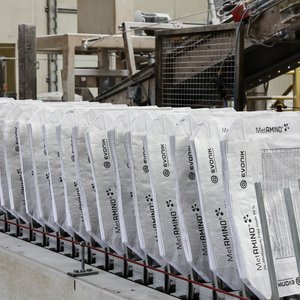Alltech recently conducted a survey of European feedstuffs from the 2013 harvest using their 37+™ Program. In announcing the results, Alltech urged producers to protect their animals and their profits from the dangers of mycotoxins. The survey found that 100 percent of both wheat and corn samples analyzed contained mycotoxins, and furthermore that the presence of just one mycotoxin in a sample is the exception rather than the rule.
rn
A staggering 93 percent of corn samples contain six-12+ mycotoxins, while 78 percent of wheat samples contained three-11 mycotoxins. This multiple mycotoxin contamination is a real concern as the presence of one mycotoxin often exaggerates the effect of another and as a result, the impact on animal health and performance is greater than is expected. The survey showed high levels of risk associated with wheat particularly in the Northern and Eastern Europe due to the presence of DON (found in 90 percent of samples),Type A and Type B Trichothecenes and other Penicillium toxins.
rn
Corn samples too were found to have widespread broad spectrum contamination. The breakdown of mycotoxins present in corn samples varied significantly according to geographical location. For example, Type B Trichothecenes were the predominant risk in Northern Europe while fumonisins, Type B Trichothecenes and Type A Trichothecenes presented greater risk in Eastern Europe.
rn
Alltech, a leader in animal health and performance, through its 37+ Program has identified 38 toxins most detrimental to animal health and performance. The samples were analyzed at the Analytical Services Laboratory, powered by Alltech, for the presence and level of these 38 separate mycotoxins. Alltech’s dedicated Mycotoxin Management Team can interpret the findings so that producers have a more accurate picture of how the mycotoxins can affect the quality of European feedstuffs and in turn each of the major species. The team has developed the Risk Equivalent Quantity (REQ), one figure that represents the overall risk to a given species’ health and performance by considering the challenge as a whole.
rn
Alltech’s Mycotoxin Management Team will continue to monitor the 2013 crop as it is stored and will provide regular updates to make producers aware of the mycotoxin risks to the welfare and performance of their livestock. Pedro Caramona, Alltech’s Mycotoxin Management Team, said, “Increased understanding of the widespread threat mycotoxins can pose will arm producers with the tools they need to take steps to tackle the challenges of 2013’s harvest long after the crop has been cut”.
rn
Nick Adams, global sales director, Alltech’s Mycotoxin Management Team, said, “This time of year is a crucial for producers and the findings of our 37+ harvest survey will be extremely relevant to producers since it will be from this harvest that their animals will be fed throughout the next year or so. Furthermore, the results demonstrate the need for producers to put in place an integrated mycotoxin management programme that considers the challenge as a whole – from harvest to feed out and storage to feed management.’
rn
“European producers experienced significant hardship as a result of feeding contaminated grains throughout 2013, and trading restrictions meant sourcing alternatives was not always an option. We want to make sure European producers understand the risks associated with 2013’s harvest and are prepared. Our team is made up of technical, research and field based people who focus on management techniques and solutions that help producers safeguard the quality of their feed and the health of their animals,” said Caramona.
rn
Increased demand on animal performance and productivity inevitably brings new challenges and risks to modern animal production. Mycotoxins and their impact on the health and performance of animals are inherently linked to these demands, threatening the safety of feed and the security of food supply. Effective mycotoxin management is, now more than ever, fundamental to the success of any farm or feed mill.
rn










